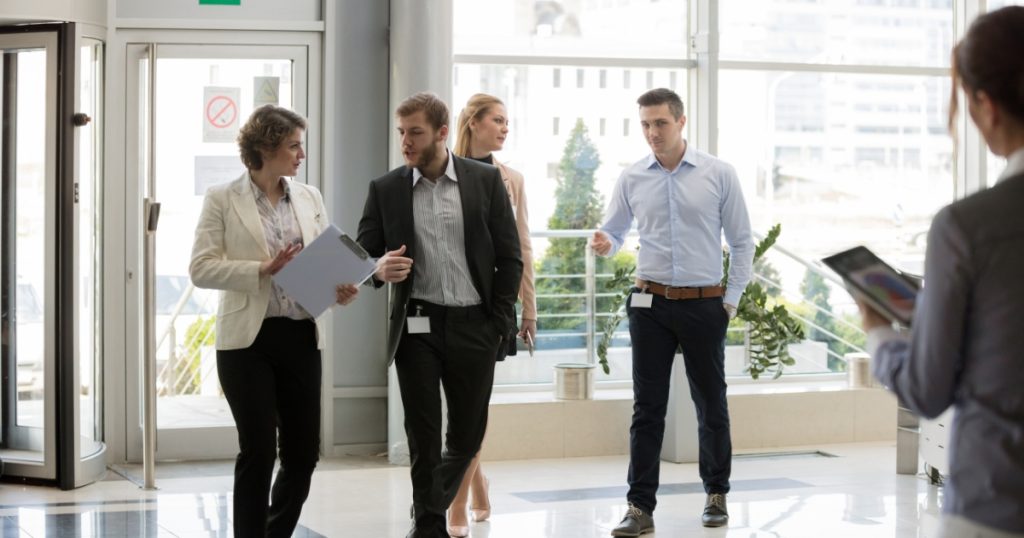The security of your office should be a top priority for any business owner. Not only does a secure workplace protect your employees and valuable assets, but it also ensures the smooth operation of your business.
In this article, we will discuss various tips and tricks from a locksmith’s perspective to help you improve the security of your office.
By implementing these suggestions, you can create a safe and productive environment for your staff and clients alike.
Assessing Your Office’s Security Needs
Before you can effectively increase your office’s security, you need to assess your current security measures and identify any vulnerabilities. This can be done by conducting a thorough security audit. Walk through your office and consider the following:
- What types of locks are currently installed on doors and windows?
- Are there any obvious points of entry that would be easy for a burglar to exploit?
- How are keys and access cards managed and stored?
- What security systems are in place, and are they functioning properly?
By identifying weaknesses in your current security setup, you can make informed decisions on the most effective ways to improve it.
Choosing the Right Locks and Security Systems
One of the most critical aspects of office security is the choice of locks and security systems. By selecting high-quality products and working with a reputable local locksmith, you can significantly enhance the safety of your office.
High-Security Locks
Investing in high-security locks is one of the most effective ways to deter burglars. These locks are built with advanced features, such as pick-resistant cylinders and reinforced materials, that make them more resistant to break-ins.
Popular high-security lock brands include Medeco, Mul-T-Lock, and ASSA ABLOY.
When selecting locks for your office, consider deadbolts for external doors and high-security padlocks for storage areas or gates.
Additionally, look for locks that have been tested and certified by the British Standards Institution (BSI), as these locks meet the highest industry standards.
Access Control Systems
Access control systems are a great way to restrict access to your office, ensuring that only authorised personnel can enter. There are several types of access control systems to choose from, including key card systems, biometric readers, and smart locks.
Each system offers different levels of security and convenience, so you’ll need to evaluate which one best suits your office’s needs.
Key card systems, for example, require employees to swipe or tap a card to gain access to the building. Biometric readers use unique characteristics, such as fingerprints or facial recognition, to identify authorised users.
Smart locks can be controlled remotely using a smartphone app, allowing you to lock and unlock doors from anywhere.
Security Cameras
Security cameras can be a powerful deterrent for potential intruders and provide valuable evidence in the event of a security breach.
When selecting cameras for your office, consider the following features:
- High-definition video quality for clear footage
- Night vision capabilities for monitoring after-hours activity
- Remote viewing and recording via a smartphone app or web interface
- Motion detection to alert you when activity is detected
Install cameras at strategic locations, such as entrances and exits, reception areas, and parking lots. Regularly review and maintain the footage to ensure that your security cameras remain an effective tool in your overall security strategy.
Reinforcing Entry Points
Securing your office’s entry points is essential for preventing break-ins. This includes both doors and windows, as well as any other potential access points, such as skylights or roof hatches.
Doors
Start by examining the doors in your office. Are they made of solid materials, such as metal or solid wood? Hollow-core doors are easily compromised and should be replaced with sturdier options. Additionally, consider installing the following:
- Door reinforcement plates to strengthen the doorjamb
- High-security strike plates to improve the door’s resistance to forced entry
- Door closers to ensure that doors always close securely behind users
- Door alarms to alert you when a door is opened without proper authorisation
Windows
Windows can be a weak point in your office’s security, so it’s important to take measures to strengthen them. Install window locks and reinforce the glass with security film, which can prevent the glass from shattering when struck.
In high-risk areas, consider installing bars or grilles for added protection. Additionally, ensure that all windows are regularly inspected and maintained to prevent them from becoming easy access points for intruders.
Secure Your Office’s Interior
Protecting your office’s interior is just as important as securing its exterior. Implementing the following measures can help to safeguard your assets and sensitive information.
Key Control and Management
Proper key control and management are crucial to maintaining the security of your office. Establish a strict key management policy that includes:
- A designated key holder responsible for the distribution and collection of keys
- A record of all keys issued and returned
- Regular audits of key inventory
- Rekeying or changing locks when keys are lost or stolen, or when employees leave the company
For added convenience and security, consider implementing a master key system, which allows authorised personnel to access multiple areas of the office using a single key.
Secure File Storage
Sensitive documents, such as employee records, contracts, and financial information, should be securely stored to protect against theft or unauthorized access.
Invest in fireproof and burglar-resistant filing cabinets, safes, or lockable storage rooms for this purpose. Additionally, establish a document retention policy and securely dispose of sensitive documents when they are no longer needed.
Employee Training
Your employees play a crucial role in maintaining the security of your office. Provide regular security training to ensure that they understand the importance of following security procedures and are aware of potential threats. Topics to cover in these training sessions may include:
- Proper key management and access control protocol
- Identifying and reporting suspicious activity
- How to respond to security breaches or emergencies
- Maintaining a clean desk policy to prevent sensitive information from being left unattended
Additional Security Measures
In addition to the measures discussed above, there are several additional security enhancements you can implement to further increase the safety of your office.
Alarms and Monitoring Services
Installing an alarm system can deter potential intruders and alert you to security breaches. Choose an alarm system that provides coverage for all entry points, including doors and windows.
Consider connecting your alarm system to a professional monitoring service, which can dispatch law enforcement in the event of a break-in or other emergency.
Security Lighting
Well-lit exteriors can deter criminals, as they are less likely to target a location where they can be easily seen. Install security lighting around your office, focusing on entry points and areas with poor visibility.
Consider using motion-activated lights or lights on timers to conserve energy and ensure that your office is consistently well-lit.
Emergency Plans
Developing and implementing emergency plans for various security scenarios, such as break-ins, fires, or natural disasters, can help to ensure the safety of your employees and assets.
Regularly review and update these plans, and conduct drills to familiarise your staff with the appropriate response procedures.
Partnering with a Professional Locksmith
Working with a professional locksmith can greatly enhance the security of your office. A reputable local locksmith can provide expert advice on the most effective security measures for your specific needs and can help with the installation and maintenance of high-quality locks and security systems.
When selecting a locksmith, consider the following:
- Look for a locksmith with a strong reputation and positive customer reviews.
- Choose a locksmith who is a member of a professional organisation, such as the Master Locksmiths Association (MLA), which ensures that they adhere to a code of ethics and practice.
- Verify that the locksmith is properly licensed and insured.
- Discuss your security needs with the locksmith and ask for a detailed quote before agreeing to any work.
Conclusion
Improving the security of your office is essential for the protection of your employees, assets, and sensitive information.
By implementing the tips and tricks outlined in this article, you can significantly enhance your office’s security and create a safer working environment.
Remember that partnering with a professional 24/7 locksmith can provide valuable expertise and support in selecting, installing, and maintaining the most effective security measures for your unique needs.

